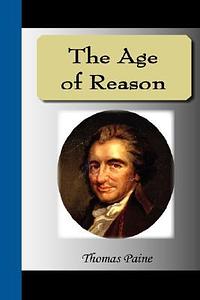Take a photo of a barcode or cover
Destroys the Bible book by book, chapter by chapter . . . even whilst a Deist. Stumbled upon this books years ago as an Evangelical Christian, and it rocked my world. Upon investigation into Paine's claims, I gave up Christianity, mostly due to this book.
challenging
informative
medium-paced
informative
reflective
medium-paced
It feels to check a book off my to read list, especially one that has not it from the get-go. Nevertheless, a bit of a redundant work, the same language used repeatedly to accentuate similar points over and over and over. Lots of these ideas are old hat to me (I hear a lot of the atheists in my life regurgitate it, although in their cases with more unwelcome vitriol), and so not particularly insightful. Still, Paine's observations on prophecy and poetry are not only interesting, but exciting and useful.
The deist Thomas Paine very well reinforces the fact that most Christians do not read the bible with an objective viewpoint. Striping down both the old and the new Testament and presenting all the contradictions, inconsistencies(Most books in the Bible being written years after said event occurred) and evils(many done by said deity) present in these two books and how the ones in power use religion to stay in control. He proves that organised religion contradicts the divine plan of a omnipotent and loving creator. A very enlightening book, with a great secular and humanist sentiment, definitively recommend it.
Wow. It is amazing to me to think this book was written in 1794/95. One of the most influential thinkers/writers/pamphleteers of the American AND French revolutions. You can't read [a:Christopher Hitchens|3956|Christopher Hitchens|http://photo.goodreads.com/authors/1334621246p2/3956.jpg], [a:Richard Dawkins|1194|Richard Dawkins|http://photo.goodreads.com/authors/1188068989p2/1194.jpg] or [a:Bart D. Ehrman|643|Bart D. Ehrman|http://photo.goodreads.com/authors/1237161718p2/643.jpg] and not feel that these authors ALL owe huge debts of gratitude to Thomas Paine and his last book. 'The Age of Reason', which essentially advocated deism, promoted humanism, reason and freethinking, and violently quarelled with ALL institutionalized religion (especially Christianity, viz the Bible), turned one of the heroes of the American Revolution into a social pariah. Only 6 people showed up for his funeral in 1809 (15 years after 'The Age of Reason' was first published) because many were still horrified by 'The Age of Reason'. Thomas Paine was an amazing thinker and like Hitch, I might not always agree with the end result of their thinking, but I am always amazed at the energy, force, originality and bravery of their thought.
"The setters up, therefore, and the advocates of the Christian system of faith, could not but foresee that the continually progressive knowledge that man would gain by the aid of science, of the power and wisdom of God, manifested in the structure of the universe, and in all the works of creation, would militate against, and call into question, the truth of their system of faith; and therefore it became necessary to their purpose to cut learning down to a size less dangerous to their project, and this they effected by restricting the idea of learning to the dead study of dead languages."
How do you rate Thomas Paine? I listened to the first part of this book on audio. The reader sounded maybe even more pompous than Mister Paine might have been, but how can you help being condescending in a world where the average person doesn't have any education to speak of & you yourself are riding the wave of the birth of democracy?
Even so, more religious conservatives should read. Old Time Religion was not necessarily what they pictured at all.
How do you rate Thomas Paine? I listened to the first part of this book on audio. The reader sounded maybe even more pompous than Mister Paine might have been, but how can you help being condescending in a world where the average person doesn't have any education to speak of & you yourself are riding the wave of the birth of democracy?
Even so, more religious conservatives should read. Old Time Religion was not necessarily what they pictured at all.
To the point and entertaining - The only way to properly debunk myths.
Destroys the Bible book by book, chapter by chapter . . . even whilst a Deist. Stumbled upon this books years ago as an Evangelical Christian, and it rocked my world. Upon investigation into Paine's claims, I gave up Christianity, mostly due to this book.
Thomas Paine plays the ace and brings the house of cards down: the wizard behind the curtain is dead, the emperor has no clothes.
Don’t be mistaken, this would be shocking if it were written today. But no, incredibly, this was the eighteenth century, before modern scholarship, in the depths of scientific anthropocentrism and Biblical literalism. “If only,” 200 years later, with what we now know— but here’s America, trying to write Thomas Paine out of history books and cover up the trace.
Here’s the kicker, though: it’s split to Part I and Part II due to Paine’s imprisonment during the French Revolution. The Age of Reason was both his urgent final words and his urgent first.
Lest I just start repeating praises that have already been sung, here’s the review that nails the home run.
Don’t be mistaken, this would be shocking if it were written today. But no, incredibly, this was the eighteenth century, before modern scholarship, in the depths of scientific anthropocentrism and Biblical literalism. “If only,” 200 years later, with what we now know— but here’s America, trying to write Thomas Paine out of history books and cover up the trace.
Here’s the kicker, though: it’s split to Part I and Part II due to Paine’s imprisonment during the French Revolution. The Age of Reason was both his urgent final words and his urgent first.
Lest I just start repeating praises that have already been sung, here’s the review that nails the home run.

